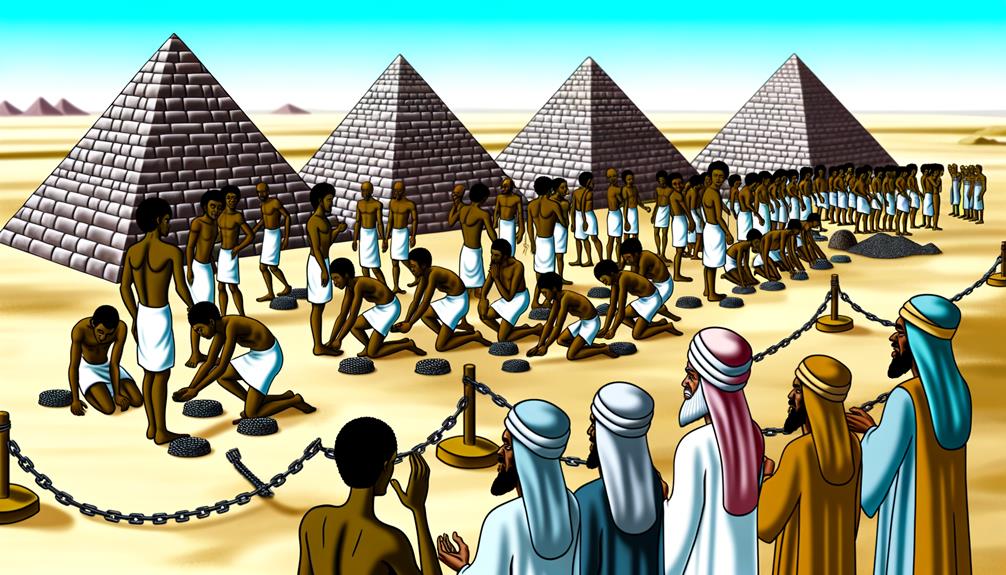Meaning of 400 in the Bible: Symbol of Trial
In the Bible, the number 400 holds deep symbolic and historical significance, often denoting periods of trial, divine judgment, and the completion of extensive eras. It symbolizes the 400 years of Israelite slavery in Egypt, highlighting their suffering and eventual deliverance.
Additionally, it represents the silence between the Old and New Covenants and appears in narratives like Esau’s 400 men, which underscores moments of reconciliation and conflict. The number also features in the story of Elijah and the prophets of Asherah, marking religious confrontations.
These contexts reveal richer theological implications and spiritual lessons embedded within biblical narratives.

Meaning of 400 in the Bible: Symbolism and Spiritual Significance
| Aspect | Details |
|---|---|
| Number | 400 |
| Biblical Meaning | Symbol of a long period of trial, bondage, or testing |
| Key Scripture | Genesis 15:13 – Israel’s 400 years of affliction in Egypt |
| Spiritual Symbolism | Time of preparation before deliverance or promise fulfillment |
| Related Themes | Patience, endurance, God’s sovereignty, covenant fulfillment |
| Numerical Insight | Often connected to significant prophetic or redemptive timelines in scripture |
400 Years of Israelite Slavery

The 400 years of Israelite slavery in Egypt, as recorded in the biblical narrative, serve as a significant period of suffering and development for the nascent nation of Israel. This epoch, characterized by severe oppression, is pivotal in shaping the Israelites’ collective identity and their relationship with God.
The servitude period is often interpreted as a divine test, aimed at refining the Israelites’ faith and resilience. Theologically, it underscores themes of deliverance and covenantal promise, foreshadowing the eventual Exodus and God’s redemptive intervention.
Historically, this timeframe also allows for the population growth and cultural consolidation necessary for the Israelites to emerge as a formidable, unified entity. Consequently, the 400 years of bondage are integral to understanding Israel’s foundational narrative.
The 400 Prophets of Asherah

The narrative of the 400 prophets of Asherah, mainly featured in the context of the confrontation between the prophet Elijah and the prophets of Baal, offers rich historical and theological insights.
These prophets, who served under Queen Jezebel, represent the profound religious tensions and idolatrous practices that challenged the monotheistic faith of ancient Israel.
Examining their role within Elijah’s story and the broader biblical symbolism provides a nuanced understanding of their significance in both historical and interpretive dimensions.
Historical Context and Significance
In examining the historical context and significance of the 400 prophets of Asherah, it becomes evident that their presence illuminates the religious and political dynamics of ancient Israel.
These prophets were associated with the worship of Asherah, a prominent Canaanite deity, which reflected the religious syncretism prevalent during the period. Their existence under the reign of King Ahab highlights the tension between monotheistic Yahwism and polytheistic practices endorsed by the monarchy.
- Religious Syncretism: The blending of Yahwist and Canaanite religious practices.
- Political Influence: The prophets’ endorsement by Queen Jezebel, indicating royal support.
Understanding these dynamics provides a foundation for exploring further complexities in Israel’s religious history.
Role in Elijah’s Story
Elijah’s confrontation with the 400 prophets of Asherah epitomizes the dramatic clash between monotheistic and polytheistic forces within the narrative of ancient Israel.
This episode, detailed in 1 Kings 18, highlights the prophet Elijah’s challenge to the religious practices endorsed by Queen Jezebel, a staunch supporter of Baal and Asherah worship.
The number 400, symbolizing a substantial plurality, underscores the magnitude of polytheistic influence Elijah faced.
This narrative serves as a poignant reflection of the theological and cultural tensions of the period, reflecting the broader struggle for religious supremacy.
It also delineates Elijah’s role as the defender of Yahweh’s covenantal fidelity, confronting and discrediting the prophets of Asherah in a dramatic display of divine power.
Symbolism and Interpretations
Contextualizing the number 400 within the narrative framework, scholars often interpret it as symbolically representing completeness and the formidable challenge posed by widespread idolatry.
The 400 prophets of Asherah mentioned in 1 Kings 18:19 serve as a vivid exemplar of this symbolism. Their collective presence underscores the pervasive influence of Asherah worship within Israelite society, juxtaposed against the monotheistic worship of Yahweh.
This numerical symbolism manifests in three essential ways:
- Completeness of Idolatry: Represents the extensive and entrenched nature of idol worship.
- Test of Faith: Highlights the intensity of the spiritual struggle faced by Elijah and the faithful.
Abraham’s 400 Shekels

The mention of Abraham’s payment of 400 shekels of silver to Ephron the Hittite for the purchase of the cave of Machpelah (Genesis 23:16) holds significant theological and historical implications within the biblical narrative.
This transaction is not merely a commercial exchange but symbolizes the establishment of a perpetual burial site for Abraham’s lineage, reinforcing God’s covenantal promise of land to Abraham’s descendants.
The specific amount, 400 shekels, underscores the transaction’s legitimacy and Abraham’s willingness to comply with local customs, thereby fostering peaceful relations.
Additionally, this payment marks a pivotal moment where Abraham shifts from a nomadic existence to a tangible claim in the Promised Land, embodying faith and divine fulfillment.
Esau’s 400 Men

The account of Esau’s 400 men in Genesis 32:6 introduces a moment of significant tension, as Jacob prepares to meet his estranged brother.
The narrative leaves Esau’s intentions ambiguous, prompting Jacob to engage in strategic preparations to safeguard his family and possessions.
This episode underscores the multifaceted symbolism of the number 400 within biblical texts, entwining themes of conflict, reconciliation, and divine providence.
Esau’s Intentions Unclear
Amidst Jacob’s return to Canaan, the presence of Esau’s 400 men introduces an element of ambiguity regarding Esau’s intentions, raising questions about whether he seeks reconciliation or retribution.
The biblical narrative does not explicitly state Esau’s motives, leaving room for scholarly debate and interpretation. This uncertainty is heightened by the historical context of their strained relationship, marked by past conflicts over birthright and blessings.
- Historical Context: Esau and Jacob’s earlier conflicts create a backdrop of tension.
- Numerical Symbolism: The number 400 itself can symbolize completeness or a significant epoch.
This ambiguity serves to deepen the narrative complexity, inviting further exploration.
Jacob’s Strategic Preparations
Faced with the uncertainty of Esau’s intentions and the imposing presence of his 400 men, Jacob implements a series of strategic measures to safeguard his family and possessions.
Recognizing the potential threat, Jacob divides his people and livestock into two camps, reasoning that if Esau attacks one, the other might escape (Genesis 32:7-8).
Additionally, Jacob sends ahead a sequence of gifts to Esau, hoping to appease him and mitigate potential hostility (Genesis 32:13-20).
This careful orchestration underscores Jacob’s prudence and tactical acumen in the face of danger.
His actions reflect a blend of fear, hope, and faith, revealing the gravity of the impending encounter and the significance of the number 400 in this biblical narrative.
The Period of Judges

Frequent references to the number 400 during the Period of Judges suggest a symbolic representation of completeness and divine intervention in biblical narratives.
The number often appears in contexts that underscore the cyclical nature of Israel’s history, marked by phases of apostasy, oppression, repentance, and deliverance. For instance, the accounts of various judges imply a divine orchestration of events to fulfill God’s covenantal promises.
- Historical Phases: The cyclical pattern of Israel’s obedience and disobedience is highlighted.
- Covenantal Fulfillment: Emphasizes God’s unwavering commitment to His covenant with Israel.
Thus, the number 400 acts as a theological marker, reflecting God’s sovereignty and the fulfillment of divine purposes during this era.
Symbolism of 400 Days

The symbolism of 400 days in the Bible often conveys a period of significant spiritual transformation and divine testing. This duration, while not as commonly cited as 40 days or 40 years, represents an extended time frame wherein individuals or groups undergo profound changes, reflecting God’s intent to refine and prepare His people.
For instance, the prophetic actions of Ezekiel, who lay on his side for 390 days to symbolize Israel’s iniquity and 40 more for Judah, highlight the intensive nature of such periods.
Consequently, 400 days can be seen as an amplification of the testing and purification themes inherent in biblical numerology, underscoring the transformative trials ordained by divine will.
Prophetic Significance of 400

Often imbued with deep eschatological meaning, the number 400 in biblical prophecy signifies a period of divine fulfillment and culmination of God’s promises. This number represents a transformative epoch within the sacred texts, symbolizing both judgment and liberation. Prophetic interpretations of 400 often highlight its role in marking significant, divinely ordained changes.
- Completion of Promises: The 400 years of Israelite bondage in Egypt culminated in their deliverance, fulfilling God’s covenant.
- Period of Testing: The interval can signify a prolonged period of trial and purification, preparing believers for a new covenant or revelation.
- Divine Preparation: It underscores a time of preparation for God’s people, leading to a significant spiritual or historical event.
This prophetic lens underscores 400 as a pivotal number in biblical prophecy.
400 in Biblical Numerology

Biblical numerology, a field that explores the symbolic meanings and significance of numbers within the sacred texts, reveals that the number 400 holds profound theological and esoteric implications.
This number appears in various contexts, always imbued with meanings that extend beyond mere mathematical value. For instance, the number 400 often signifies a period of trial, testing, or divine judgment.
| Biblical Reference | Context | Significance |
|---|---|---|
| Genesis 15:13 | Abraham’s prophecy | Period of enslavement |
| Exodus 12:40 | Israelites in Egypt | Duration of bondage |
| Judges 20:15 | Battle of Gibeah | Total number of warriors |
| 1 Kings 18:19 | Prophets of Baal | Symbol of false prophecy |
Through these examples, it becomes evident that 400 consistently represents substantial epochs within the biblical narrative.
Historical Contexts of 400

Examining the broader historical contexts in which the number 400 appears further illuminates its significance and recurrent themes within biblical narratives. This number often indicates periods of time that are pivotal for the development of God’s people and covenantal relationships.
For instance, the Israelites endured 400 years of slavery in Egypt, a timeframe that underscores themes of suffering and eventual deliverance.
Similarly, 400 years of silence between the Old and New Covenants signify a period of waiting and anticipation for the messianic fulfillment.
Additionally, the mention of 400 men accompanying Esau when he met Jacob highlights moments of potential conflict and reconciliation.
- 400 years of Israelite slavery in Egypt
- 400 years of prophetic silence between Covenants
Divine Judgment and 400

The number 400 in biblical texts often symbolizes a significant timeframe of divine judgment, as seen in the 400 years of Israelite bondage in Egypt, which underscores a period of trial and purification.
This duration not only highlights the severity of divine retribution but also serves as a prophetic marker, indicating the fulfillment of God’s promises and the eventual deliverance.
Such instances underscore the theological importance of 400 as a measure of divine orchestration and covenantal faithfulness.
Symbolic Timeframe of Judgment
In biblical numerology, the number 400 is often interpreted as a symbolic timeframe associated with periods of divine judgment and testing. This interpretation stems from various scriptural instances where 400 years mark significant epochs of trial and divine intervention. Contextually, the number signifies a completion of a divine cycle, leading to transformative outcomes.
Key facets of this symbolism include:
- Judgment: 400 years frequently denotes a period wherein a community or nation faces divine scrutiny.
- Testing: These intervals are often characterized by trials that test faith and resilience.
Thus, the number 400 encapsulates a profound thematic element of judgment, testing, and eventual redemption within biblical narratives.
Israelite Bondage Duration
One of the most notable instances of the number 400 symbolizing divine judgment and testing is found in the duration of the Israelites’ bondage in Egypt.
According to Genesis 15:13, God informed Abraham that his descendants would endure 400 years of affliction in a foreign land. This period of servitude and suffering not only reflects divine judgment but also serves as a profound test of faith and resilience for the Israelites.
Contextually, the 400 years signify a divinely ordained timeframe, culminating in God’s subsequent deliverance and fulfillment of His covenant promises. This prolonged period underscores the themes of endurance and divine justice, highlighting the theological depth and narrative function that the number 400 holds within biblical history.
Prophetic Fulfillment Significance
Prophetic fulfillment involving the number 400 often underscores themes of divine judgment, meticulously aligning with biblical narratives to emphasize God’s sovereign timing and justice.
This numerical motif serves as a profound reminder of the extensive scope of divine retribution and the culmination of prophecy. The span of 400 years frequently heralds significant shifts marked by divine intervention.
- Israelite Bondage and Deliverance: The Israelites’ enslavement for 400 years in Egypt culminated in their liberation, symbolizing God’s judgment on Egypt and fulfillment of His promise.
- Canaanite Judgment: The 400 years before the conquest of Canaan indicate God’s long-suffering patience and eventual judgment upon the Canaanites.
- Symbolic Intervals: The recurrence of 400 years highlights periods of trial, waiting, and eventual fulfillment of divine promises.
Spiritual Lessons From 400

The number 400, as seen through its various occurrences in biblical texts, often symbolizes a period of divine testing, trial, and eventual deliverance.
This pattern is evident in the 400 years of Israelite bondage in Egypt, a time that culminated in their miraculous exodus and liberation.
Similarly, the 400 men that accompanied David (1 Samuel 22:2) represent a transformative journey from distress to leadership.
These instances underscore a recurring theme: prolonged adversity often precedes divine intervention and redemption.
Consequently, the spiritual lesson gleaned from the number 400 is one of hope and perseverance, affirming that periods of trial are not merely punitive but preparatory for a greater divine purpose and fulfillment.
Conclusion
The recurrence of the number 400 in the Bible serves multifaceted roles, from symbolizing periods of trial and judgment to denoting divine completeness and fulfillment.
By examining instances such as Israelite slavery, prophetic groups, and personal transactions, it becomes clear that 400 holds significant theological and historical weight.
Scratching the surface reveals deeper spiritual lessons, prompting believers to reflect on divine orchestration throughout biblical history.
Consequently, the number 400 is more than just a figure; it is a key to understanding God’s intricate plan.






